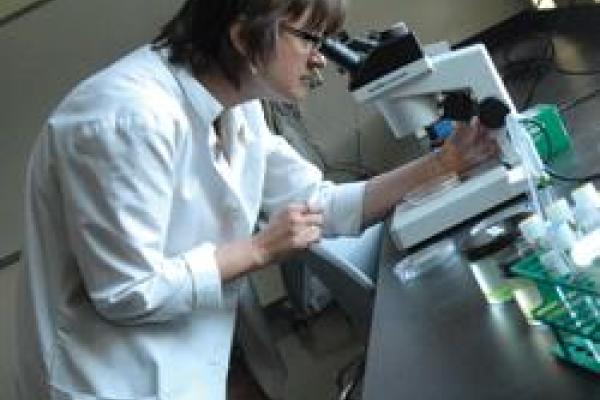A Class Act

The Center for Life Sciences Education (CLSE)
Research in biology is hot news. Biologists are unlocking life’s secrets at the molecular level at breakneck speed. Each successive discovery brings hope for solving critical problems: in alternative energy, climate change, medical therapies, world hunger—the list is endless and exciting.
Students certainly got the memo: biology is where the action is, and they want to be in on it.
Ohio State’s largest major cannot be taught “Old School.” Teaching 21st Century biology to 2,000 majors and an additional 10,000 non-majors each year is a huge responsibility. It demands examining how we learn, then rethinking how to educate.
Caroline Breitenberger, director of the CLSE, and her team are preparing Ohio State’s biology majors to take on a heavily competitive world—scientific and medical research, careers in medicine and other health care fields, academic scholarship, biotechnology, and other emerging fields.
Additionally, the CLSE is responsible for ensuring scientific literacy for non-majors in the Introductory Biology Program each year. Both groups of students pose unique problems for engagement on much more profound levels than memorizing basic biological concepts.
Student-Centered Education
Breitenberger believes ongoing training and professional development opportunities for graduate teaching associates are critical to success. The keys are focusing on student-centered education, relentlessly examining best practices, and refining how to teach teachers to teach.
“We rely heavily on Graduate Teaching Associates (GTAs); their laboratory and recitation sections are designed to take a student-centered approach to learning. Because this is a new approach for both instructors and students, we provide extensive and personalized training for all GTAs,” said Breitenberger.
This is an intensive, ongoing process that gives GTAs a variety of opportunities for learning, assessment based on measurable outcomes, and mentoring.
“We allow GTAs to start at their personal level of development and advance at a pace comfortable to them. We foster a community among the faculty, staff, and TAs that encourages reflective teaching and ongoing growth,” said Breitenberger.
This has paid off with very visible results.
Recognized Success
The CLSE was recognized by the University Center for the Advancement of Teaching and the Graduate School “for exemplary achievement in providing outstanding prior preparation and significant ongoing support to their Graduate Teaching Associates.”
Students enthusiastically attest to the program’s effectiveness.
“Knowing the CLSE and GTAs were willing to hear any feedback and adjust their classes accordingly allowed me to do my job as a student without worry. It also made me excited because I know these classes will always be evolving to suit new students and helping them learn as I did,” said Thomas Varian, biology major.
GTA Thushani Rodrigo-Peiris said, “This model is a win-win for everyone, empowering my undergraduate students, providing phenomenal professional development opportunities for myself and other GTA’s, and strengthening student-centered education.”
Breitenberger and Senior Lecturer Stephen Chordas III were recently named National Academies Education Fellows in the Life Sciences for the 2010-11 academic year. This singular honor results from their active, enthusiastic participation in the 2010 National Academies Summer Institute on Undergraduate Education in Biology, June, 2010. Competition for spaces at the Institute was highly competitive; being selected to participate was recognition of a record of superior accomplishment.
